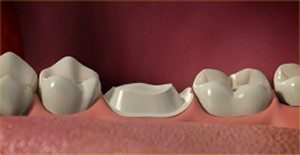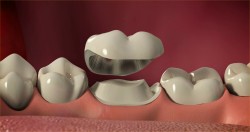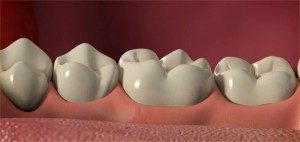If unsightly teeth are spoiling your smile, crowns can offer a neat, natural-coloured cover up. Sometimes known as ‘caps’, they fit completely over a whole tooth, concealing defects caused by chips, decay, discolouration or large fillings. Made from a variety of materials, including metal, porcelain, resin or ceramic, they can also be used to support a dental bridge or affixed to a dental implant.
Benefits
- Enhances the appearance of a tooth
- Can protect and strengthen the tooth
- Natural-looking
- Fixed in place
- Durable
- Confidence boosting
Treatment steps
- So the crown can be accommodated, we remove a layer tooth structure, but make sure we leave a strong core. The amount of tooth removed depends on the thickness of the crown, which can differ depending on the material used to make it.
- We then take impressions of your teeth and record their colour so the crown can be made to fit perfectly.
- Between appointments, we protect the prepared tooth with a temporary crown.
- When your crown is ready, the temporary crown is removed and the new permanent one fixed in place with a strong dental cement.
Aftercare
The best way to care for your crown is to stay on top of your oral hygiene – this means keeping your teeth and gums healthy by brushing with a fluoride toothpaste twice day and flossing between your teeth. You also need to see your dentist regularly for check-ups so they can keep an eye on your crown and the tooth underneath.
A crown protects a tooth from decay, but not where it meets the gum, and it does not guard against gum disease, so it’s important to keep the area clean and free from bacteria.
What is a crown?
Crowns are an ideal way to rebuild teeth which have been broken, or have been weakened by decay or a very large filling. The crown fits right over the remaining part of the tooth, making it strong and giving it the shape and contour of a natural tooth. Crowns are sometimes also known as ‘caps’. An ‘Anterior Crown’ is a crown fitted to the front eight teeth.
Why would I need a crown?
There are a number of reasons. For instance:
- the tooth may have been weakened by having a very large filling
- you may have discoloured fillings and would like to improve the appearance of the tooth
- you may have had a root filling which will need a crown to protect it
- you may have had an accident and damaged the tooth
it may help hold a bridge or denture firmly in place.
What are crowns made of?
Crowns are made of a variety of materials and new materials are being introduced all the time. Here are some of the options available at present:
- Porcelain bonded to precious metal: this is what most crowns are made from. A precious metal base is made and layers of porcelain are then applied over it.
- Porcelain: these crowns are not as strong as bonded crowns but they can look very natural and are most often used for front teeth.
- Porcelain and composite: porcelain and composite resin materials can sometimes look the most natural. However, these crowns are not as strong as bonded metal crowns.
- Glass: these crowns look very natural and are used on both front and back teeth.
Precious metal (gold and palladium): these crowns are very strong and hard-wearing, but are not usually used at the front of the mouth, where they are highly visible.
How is a tooth prepared for a crown?
The dentist will prepare the tooth to the ideal shape for the crown. This will mean rem oving most of the outer surface, and leaving a strong inner ‘core’. The amount of the tooth removed will be the same as the thickness of the crown to be fitted. Once the tooth is shaped, the dentist will take an impression of the prepared tooth, one of the opposite jaw and possibly another to mark the way you bite together. The impressions will be given to the technician, along with any other information they need to make the crown.
oving most of the outer surface, and leaving a strong inner ‘core’. The amount of the tooth removed will be the same as the thickness of the crown to be fitted. Once the tooth is shaped, the dentist will take an impression of the prepared tooth, one of the opposite jaw and possibly another to mark the way you bite together. The impressions will be given to the technician, along with any other information they need to make the crown.
Who makes the crown?
The impressions and information about the shade of your teeth will be given to a dental technician who will be skilled in making crowns. They will make models of your mouth and make the crown on these to be sure that the crown fits perfectly.
Will the crown be noticeable?
No. The crown will be made to match your other teeth exactly. The shade of the nei ghbouring teeth will be recorded, to make sure that the colour looks natural and matches the surrounding teeth. A temporary crown, usually made in plastic, will be fitted at the end of the first appointment to last until the permanent one is ready. These temporary crowns may be more noticeable, but they are only in place for about two weeks.
ghbouring teeth will be recorded, to make sure that the colour looks natural and matches the surrounding teeth. A temporary crown, usually made in plastic, will be fitted at the end of the first appointment to last until the permanent one is ready. These temporary crowns may be more noticeable, but they are only in place for about two weeks.
How long does the treatment take?
You will need to have at least two visits: the first for the preparation, impression, shade taking and fitting the temporary crown, and the second to fit the permanent crown.
Does it hurt to have a tooth prepared for a crown?
No. A local anaesthetic is used and the preparation should feel no different from a filling. If the tooth does not have a nerve, and a post crown is being prepared, then local anaesthetic may not be needed.
Are post crowns different?
Post crowns may be used when the tooth has been root filled. The weakened crown of the tooth is drilled off at the level of the gum. The dentist makes a double-ended ‘post’ to fit into the root canal. This can be either prefabricated stainless steel or custom made of gold. One end of the post is cemented into the root canal, and the other end holds the crown firmly in place.
Are there any alternatives to post crowns for root-filled teeth?
If a root-filled tooth is not completely broken down, it may be possible to build it up again using filling material. This ‘core’ is then prepared in the same way as a natural tooth and the impressions are taken.
How long will a crown last?
The life of a crown will depend on how well it is looked after. The crown itself cannot decay, but decay can start where the edge of the crown joins the tooth. It is very important to keep this area as clean as your other teeth, or decay could endanger the crown. Properly cared for crowns will last for many years – your dentist will be able to tell you how long.
How are crowns fixed to teeth?
Once the fit and appearance of the crown has been checked – and approved by you – it will be cemented in place with special dental cement. The cement also forms a seal to help hold it firmly in place.
Will the crown feel different?
Because the shape of the crown will be slightly different from the shape of your tooth befo re it was crowned, you may be aware of it to begin with. Within a few days it should feel fine, and you
re it was crowned, you may be aware of it to begin with. Within a few days it should feel fine, and you
will not notice it. The crown may need some adjustment if it feels higher than the surrounding teeth. If it is at all uncomfortable ask your dentist to check and adjust it.
Is there an alternative to a crown?
A veneer may be an alternative to having an anterior crown. Your dentist will advise you of any suitable alternatives.
